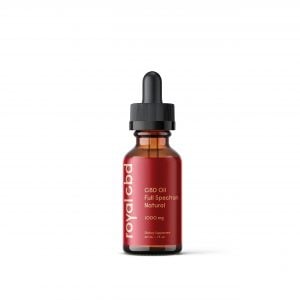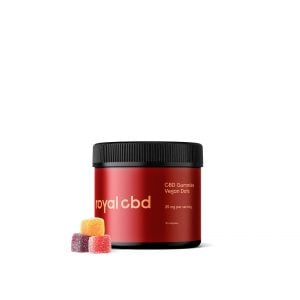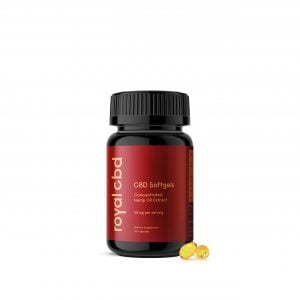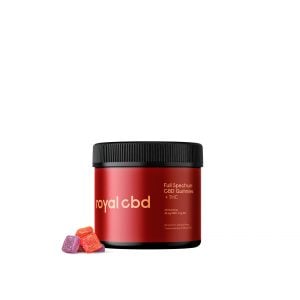Looking for handy tips for getting rid of dry mouth after taking CBD oil? This article is for you.
CBD and dry mouth go hand in hand. But this effect is common for all cannabinoids, not just CBD.
Does it mean you have to grit your teeth and accept that your mouth feels like a desert?
Or is there a method to reduce the dry mouth effect after taking CBD oils, gummies, and vapes?
We’ve come up with the 5 foolproof methods of fighting that unpleasant dryness.
But before we dive deeper, we’ll explain why CBD causes dry mouth in the first place.
Why Does CBD Oil Make Your Mouth Feel Dry?
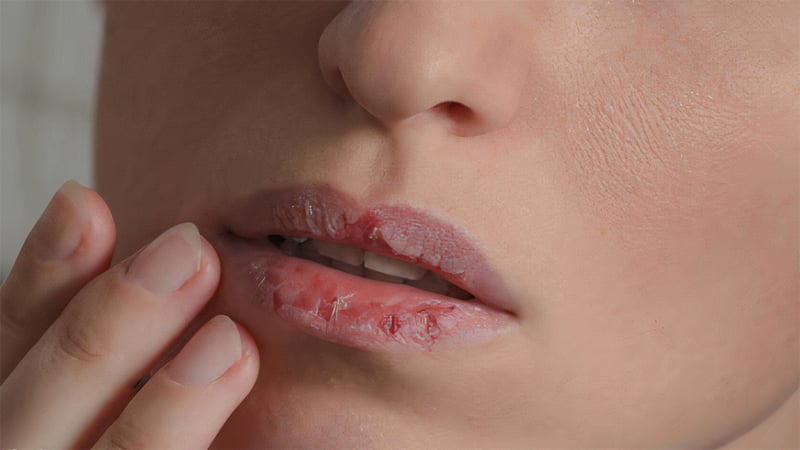
CBD acts on over 65 molecular targets, so it’s no wonder it affects many physiological processes, including saliva production.
But why does CBD give you a dry mouth?
Let’s take a look.
Cannabinoids Act on Salivary Glands
Several studies indicate that cannabis use is the reason for having a dry mouth. In a 986, researchers examined the effects of CBD and reported that the side effects of oral consumption included dry mouth.
Since then, a few other studies have looked into this relationship. Oral dryness even has its own medical term – xerostomia.
One of the most prominent studies on CBD-induced oral dryness comes from the University of Buenos Aires, Argentina. This 2006 study found that cannabinoid receptors type 1 and 2 (CB1 and CB2) are found in the submandibular glands, which occur right under the mouth and control the secretion of 60–67% of the saliva (1).
The authors also concluded that anandamide — one of the two main cannabinoids produced by the body — has a high binding affinity to these cannabinoid receptors and can inhibit the secretion of saliva.
Both THC and CBD engage with the cannabinoid receptors in the parasympathetic nervous system, having a similar effect to anandamide.
CBD Hints the Brain to Inhibit Saliva Production
The aforementioned study also found that the role of the endocannabinoid system (ECS) extends far beyond slowing the signals at the submandibular glands alone. These signals are first triggered in the brain.
The researchers came up with a theory that injecting cannabinoids through the femoral vein may not only block the saliva secretion in the submandibular gland but may also engage with both cannabinoid receptors in the brain. They hypothesized that the central nervous system is involved in saliva control at the glandular level.
Your CBD Oil is Contaminated
Impurities in CBD oil may contain hazardous byproducts, putting your health at risk. These impurities can irritate the mouth and lungs, leading to dry mouth and harshness in the oral tract.
If your CBD oil causes discomfort and severe dryness, itching, or swelling, discontinue using the product and seek medical attention right away. This isn’t a common side effect of CBD oil.
You Took too Much CBD
If you take an unusually high dose of CBD — upwards of 100 mg — you may experience side effects like dry mouth, dizziness, changes in appetite, and fatigue.
Smoking and Vaping Cannabis Can Exacerbate Dry Mouth
Cannabinoids can produce different side effects depending on their form. For example, smoking CBD hemp buds or dabbing CBD concentrates can cause coughing and dryness in the mouth aside from irritating your mouth, throat, and lungs.
Vaping, while considered safer than smoking, may also cause dry mouth when your product contains flavorings and thinning agents. Not to mention that vaporized CBD reaches your salivary glands — reducing the amount of secreted saliva.
Sublingual CBD Products Have a Stronger Effect on Salivary Glands
Sublingual CBD products, such as sprays and oils, interact directly with your salivary glands because you take them under the tongue. CBD uses these glands to reach the bloodstream faster by avoiding the liver, but at the same time, it inhibits saliva production. Taking CBD oils and sprays can cause regular dryness in the mouth.
How to Manage Dry Mouth from CBD

Having a dry mouth is almost unavoidable when you use CBD. But, that doesn’t mean you can’t manage this side effect.
In fact, there are a few methods you can use to make it more tolerable.
This section will help you if you’re a heavy CBD user and dry mouth is your daily companion.
Learn how to prevent and fight dry mouth with these simple tips.
1. Drink Water (Regularly)
The best way to prevent or offset the intensity of dry mouth when using CBD oil is to hydrate yourself properly throughout the day. For even better protection, you can drink other hydrating liquids, such as electrolytes, right before taking CBD. Doing so will help diminish this pesky issue. Herbal teas and warm water are the best for the job; they can also ease a sore throat, which is particularly useful if you take highly concentrated CBD oils.
2. Eat Something Sour
You can naturally stimulate saliva production by eating a sweet-and-sour treat, such as a lollipop, lozenge, or gummy. Brushing your teeth with toothpaste will also spur the activity of your salivary glands, creating moist film lining on mucous membranes and preventing dry mouth.
3. Chew Gum
Chewing gum is another way to avoid dry mouth after taking CBD. Just make sure to buy natural gum that uses peppermint essential oils and xylitol as flavorings. Xylitol is a natural sweetener that helps stimulate salivary glands and increase the production of saliva.
4. Eat Fruit
This one works in a similar fashion to sucking a lollipop or chewing a gummy. Fresh fruits, especially citrus ones (lemon, orange, pineapple) can help you reduce the dry mouth sensation. Chewing on dry fruits, ice cubes, or even beef jerky will also cause your salivary glands to produce more saliva — especially when you combine it with drinking water.
5. Try Other Forms of CBD
Some forms of CBD are less likely to give you a dry mouth feeling. Try using CBD capsules or gummies (just make sure to bite them and swallow them right away), and if the problem is localized, apply a topical product, such as CBD cream, balm, or roll-on stick. Topicals are the only products that don’t cause dry mouth.
How Does Saliva Form in the Mouth?
Since the dry mouth is caused by compromised secretion of saliva, let’s elaborate on how saliva formation takes place.
Saliva is formed at two levels.
First, specialized cells called acinar cells create a fluid with a composition almost identical to plasma. Then, this fluid reaches salivary ducts to pass through the oral cavity, and once there, sodium chloride is taken away from it, and potassium and bicarbonate replace it.
This stage is called the final hypnotic solution.
Saliva secretion occurs in the parasympathetic nervous system (PSNS). The PSNS is responsible for controlling different metabolic functions associated with appetite, food intake, and eating cues.
Salivary receptors are activated by stimulating the Corda tympani nerve. This key nerve derives from the taste buds before traveling through the network of nerve cells in the submandibular gland.
The Corda tympani nerve forms a chemical known as acetylcholine, which is the body’s primary saliva-inducing compound and binds directly to the receptors of the submandibular gland.
Another essential chemical for the formation of saliva is norepinephrine. This molecule stems from the preganglionic nerves and interacts with the myoepithelial cells surrounding the acinar cells.
This reaction leads to saliva secretion.
Other Side Effects of Using CBD
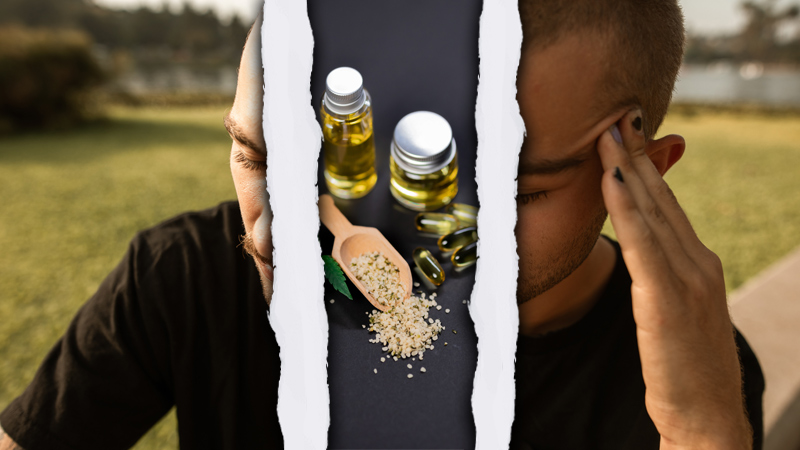
Although the World Health Organization acknowledged CBD as safe in their 2017 report, it also has some mild adverse reactions when you take too much. If you take any medications, you should talk to your doctor before buying CBD oil because cannabidiol can interact with different meds and cause collateral side effects.
Here’s what you need to know about the common side effects of CBD.
Fluctuation of Appetite
The biphasic nature of CBD causes it to produce different effects in the same person depending on the dose. Some studies have found that CBD is a mild appetite suppressant, while others claim it can actually boost their appetite. When you take CBD oil, observe your body’s response, and if you notice any bothering changes in your appetite, adjust the dosage to reduce fluctuations.
Diarrhea
Some users report diarrhea or indigestion after taking CBD. This side effect is rare and occurs when you take a large dose of CBD due to the irritation of the gastrointestinal tract. Studies have found that diarrhea is triggered in people who take more than 300 mg of CBD oil per serving.
Low Blood Pressure
In a 2017 study, the researchers found that a single dose of CBD can cause a drop in blood pressure in healthy individuals. This feature applies both to people who are at rest and those put under a stressful situation. This side effect can be dangerous for people who take blood pressure medication.
When CBD interacts with blood pressure meds, you may feel unusually lightheaded or drowsy. Sit down and drink some water to help stabilize blood pressure, and avoid physical activity to prevent fainting.
Dizziness
Coming back to the biphasic nature of CBD, taking high doses of CBD oil may induce sedation or drowsiness. If you benefit from such doses, try taking CBD in the evening or 30-40 minutes before bed so that you can remain productive during the day.
CBD and Dry Mouth: Bottom Line
CBD can cause dry mouth because it interacts with the cannabinoid receptors in the salivary glands.
When you use sublingual forms of CBD (oils and sprays) or inhale it (CBD joints and vapes), these supplements can trigger some side effects, such as a dry mouth feeling. Usually, the higher the dose, the more pronounced this reaction will be.
Make sure to use clean CBD products, chew gum, eat fruit, and hydrate yourself to prevent and reduce the intensity of dry mouth.
No matter which form of CBD you go with, always check if your product has an up-to-date certificate of analysis. Doing so will help you verify its potency and purity — minimizing the risk of ingesting any dangerous chemicals that could exacerbate the dry mouth or cause side effects unrelated to CBD oil.
We hope this article will help you manage dry mouth (or even prevent it) after taking CBD.
Sources:
- Prestifilippo, J. P., Fernández-Solari, J., de la Cal, C., Iribarne, M., Suburo, A. M., Rettori, V., McCann, S. M., & Elverdin, J. C. (2006). Inhibition of salivary secretion by activation of cannabinoid receptors. Experimental biology and medicine (Maywood, N.J.), 231(8), 1421–1429. [1]
- Shannon, S., Lewis, N., Lee, H., & Hughes, S. (2019). Cannabidiol in Anxiety and Sleep: A Large Case Series. The Permanente journal, 23, 18–041.
- Kirkham T. C. (2009). Cannabinoids and appetite: food craving and food pleasure. International review of psychiatry (Abingdon, England), 21(2), 163–171. [2]
- Jadoon, K. A., Tan, G. D., & O’Sullivan, S. E. (2017). A single dose of cannabidiol reduces blood pressure in healthy volunteers in a randomized crossover study. JCI insight, 2(12), e93760. [3]
- Iffland, K., & Grotenhermen, F. (2017). An Update on Safety and Side Effects of Cannabidiol: A Review of Clinical Data and Relevant Animal Studies. Cannabis and cannabinoid research, 2(1), 139–154. [4]
